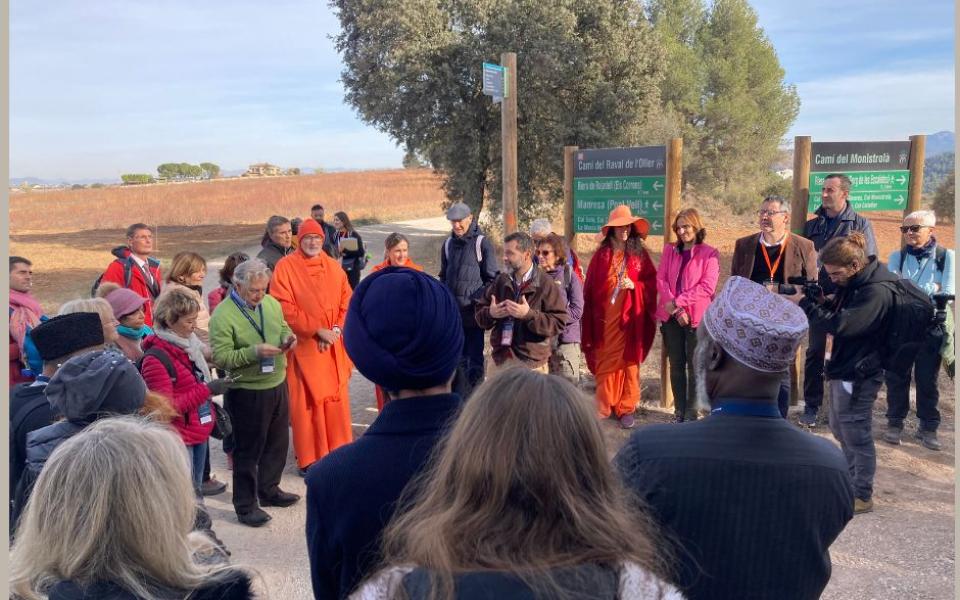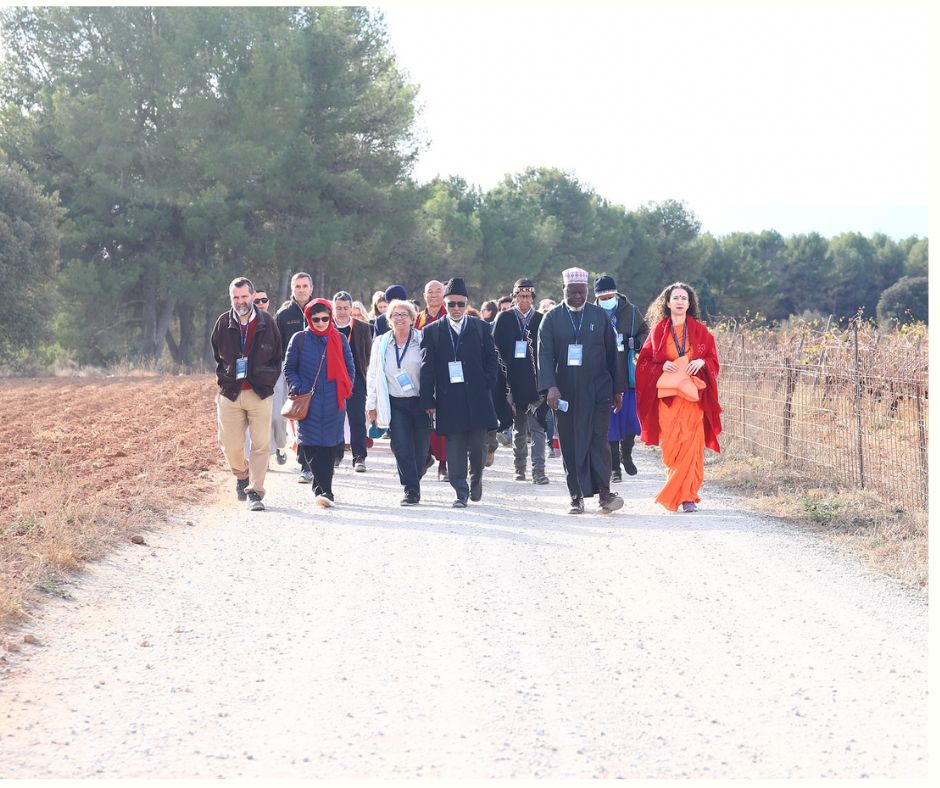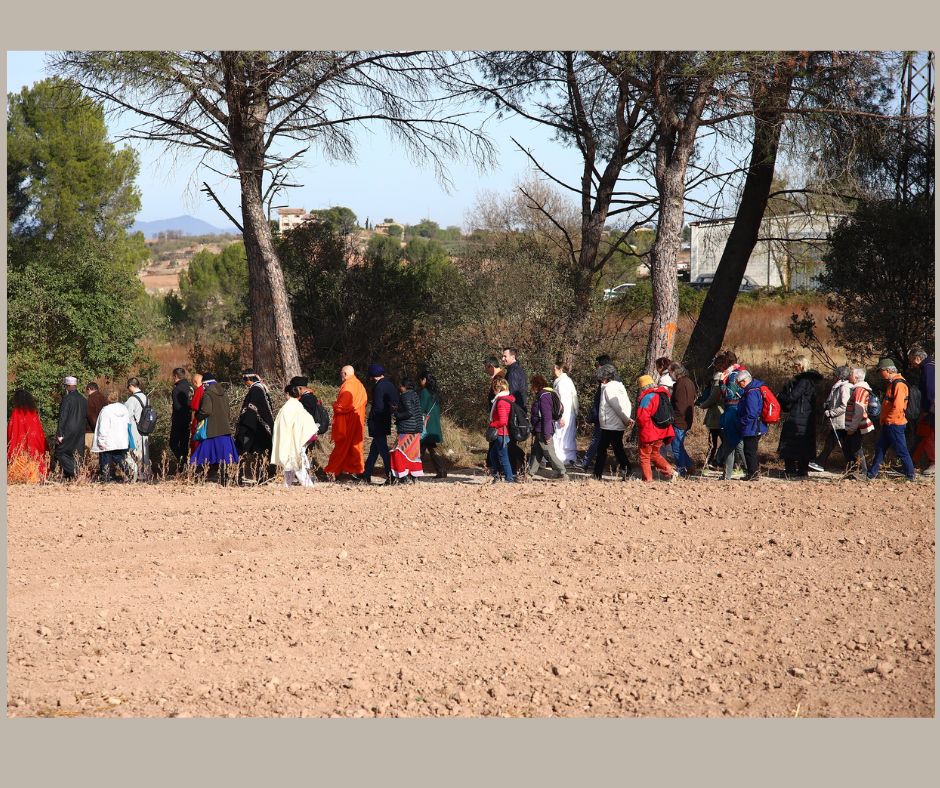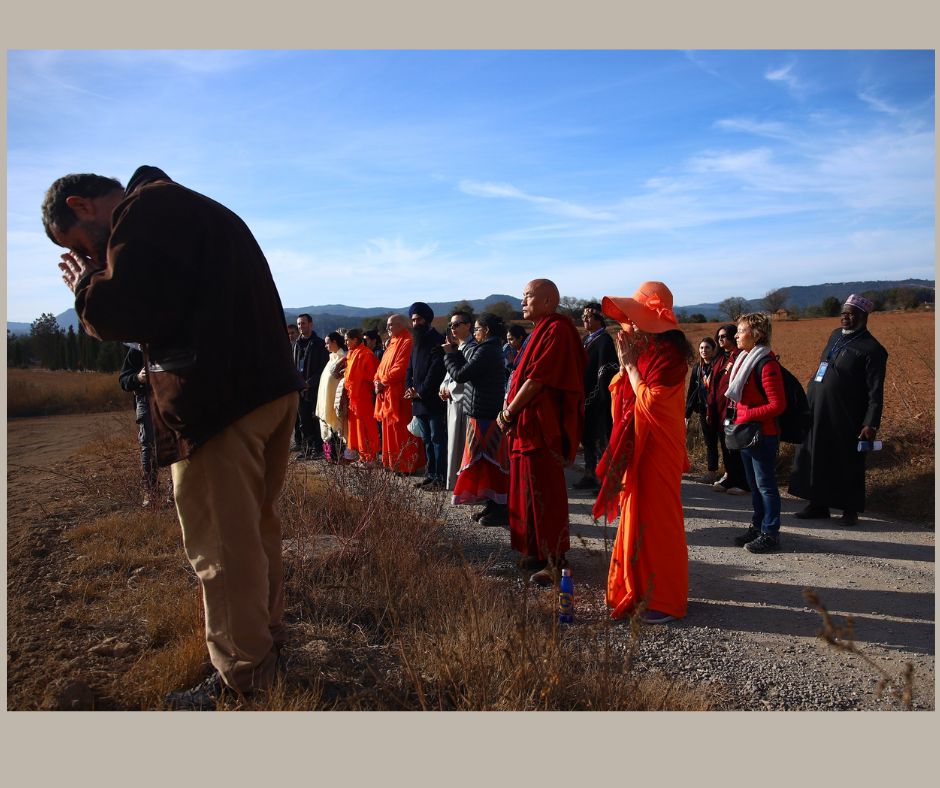
Gathering to start the walk into Manresa, following the footsteps of St Ignatius
Stepping into 2023, I’ve been thinking a lot about the work we do as peacebuilders and what it means to stay present, open and centered in very challenging times. In a world where conflicts exist in all shapes and sizes, holding strong to the path of peace and guiding and walking alongside others on this journey, calls for a certain kind of groundedness. Inspired by a recent travel experience in Spain, I’d like to share with you the story of St Ignatius of Loyola, and how the experience of following in his footsteps along the Camino, inspired in me a deeper reflection on the kind of leadership I aspire to as a peacebuilder.
500 years ago, a pilgrim on a path to Jerusalem took a rest in the city of Manresa, a small city near Barcelona, Catalonia, Spain. This pilgrim was St Ignatius of Loyola, and what was meant to be only a few days of rest, turned into a year-long stay and journey of spiritual growth, struggle, and contemplation, encountering what it means to live a spiritually authentic life. St Ignatius lived in a cave just outside the city, and served the community working in the local hospital. It was during this time in Manresa that St Ignatius wrote the Spiritual Exercises, which now informs Ignatian Spirituality and is practiced by many Christians around the world.

In honour of this 500th anniversary, the city of Manresa launched the Manresa 2022 Transforma project, to encourage events and projects that centre around the values of transformation, spirituality and social change. Part of this initiative therefore included hosting the Religions for Peace Forum, titled “At a Crossroads: A Multireligious Intergenerational Response to the Social and Environmental Crisis”. Religious leaders, youth leaders and representatives of Religions for Peace from around the world, gathered in Manresa, to engage in conversation and dialogue around key issues relating to environmental sustainability, increasing inequality and conflicts faced in and by cities.
Myself (Sarah Oliver) and Greshma Raju, from Ecopeace Teen Cafe CC, had the opportunity to represent URI in attending this Forum and to share as part of the conversation the importance and need for grassroots interfaith action in addressing the multiple social and environmental crises we face today. While there were many interesting elements to this Forum, I wanted to share a more personal reflection inspired by the experience of being guided along a section of the Camino, following in the footsteps of St Ignatius.
It was the first day of the Forum, and after meeting and greeting our fellow attendees, we were driven a short distance outside of the city, to begin a symbolic interfaith pilgrimage, walking a section of the Camino, following the steps of St Ignatius into Manresa, all those 500 years ago. As we got off the bus it was the sandy hills, the olive trees, and the donkeys on the side of the road that I noticed first. There was a quietness in the air as if the landscape held a secret waiting to be discovered. I felt a sense of excitement at this opportunity to spend some time connecting with this sacred land through the act of walking.

Before we started walking, Dr. Xavier Melloni S.J, the Director of the Cave of St. Ignatius shared 3 guiding principles for us to walk with. These were:
- To walk slowly - to kiss the ground with each step
- To walk in silence - being able to listen to the outer and our inner worlds
- To walk in poverty - to come as a pilgrim means to walk with nothing and come from a space of emptiness, ready to be filled or nurtured by the journey
As we walked, I couldn’t help thinking about what it would mean to implement these principles in our everyday lives, particularly as interfaith activists and peacebuilders. How often in our organizations and work are we rushing for the next deadline, not noticing the metaphorical steps we’re taking, and perhaps missing, in the drive to achieve our next goal? What would it look like to “walk slowly” being intentional with each step of our journeys and honouring these steps with the symbolic reverence of a kiss? What else might this intentionality and slowness allow for?
For me I think it allows for a deeper presence and gentleness of process in our peacebuilding efforts. By this I mean being present to the needs, emotions and experiences in a situation or community and in a conflict situation for example, giving the full time and attention that is needed to a true healing process. As many know, peacebuilding is not a quick fix, it’s long term work and it deserves the attention and time that is called for. Not only this but it deserves to be met with a sense of sacredness, symbolised by a kiss.
Similarly, the second invitation was to walk in silence, and as peacebuilders the art of listening is core to our work. We strive for a listening that is deeper than just words, a listening that requires a connection of the heart. Compassionate listening, that comes with the gift of first being silent. Again in our striving to make the world a better place, there’s an easy trap to fall into by missing this step of being silent first. We come in with our ideas, our solutions, our ‘do-it’ attitudes, and we forget to first take a moment to be silent and listen to the wisdom that is already present and constantly emerging. This needs to be the fuel and inspiration for our contributions.
And finally “to walk in poverty”. While there’s a danger here of essentializing an experience of poverty that is the harsh reality for the majority of the world (perhaps we can find a better word?), in the context of peacebuilding I interpreted it more to refer to the way in which we do our work. Similar to the idea of listening, this invitation challenges the top down, imposing, solution-driven approach of the development sector. Instead, it asks us to open our eyes to what is already there. It invites us to be grassroots led and to be nurtured by those we walk alongside, sharing of ourselves without an expectation of anything in return. It invites us to come from a space of emptiness, open to what emerges on the journey and ready to be filled by the experiences of life.

These three instructions for our short walk of the Camino, while simple in their delivery, offered me a beautiful reminder of what it means to be a peacebuilder (and dare I say human) in the world, and how often the way in which we approach a situation can be so much more powerful than the final ‘solution’ or outcome. I’m inspired by these guiding words or principles also in terms of a leadership style and the need we see in the world for a new emergent leadership.
These principles of slowing down, being silent and honouring the emptiness and simplicity of a pilgrims journey, have stayed with me since that walk. As we move into a new year, again with all the uncertainty of a constantly changing world, I find courage and comfort in these ideas. They allow me to begin each new day with a sense of reverence and holiness, seeing this journey of life as a pilgrims way.